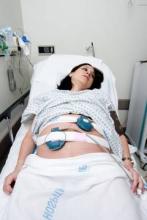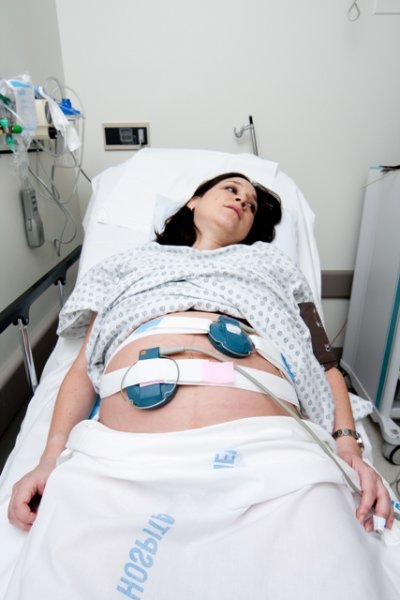User login
"Mrs. Jones in ED room 12? Septic with severe multilobar pneumonia and hypoxemic respiratory failure? Got it. I’m on my way down to the ED now." The heart races in anticipation of caring for this critically ill patient near death’s door. But it’s okay. You know exactly what you have to do. You have done it many times before. No problem. Just as you are about to hang up the phone you learn more ...
"What’s that? She is 22 weeks pregnant? Uh, all right."
Suddenly, what initially seemed to be a routine case takes a complicated twist. You are no longer caring for one life, you are caring for two (or more), and one of those is extremely frail and vulnerable. The bugs, the drugs, maintaining adequate perfusion of vital organs – both hers and her baby’s – the questions of "What if ... ?" and "Should I ... ?" race through your mind. Should you get infectious disease and pulmonary consultations for an added layer of protection or should you treat her as you have treated so many others before her, the caveat, of course, being the need to check every single drug for its teratogenicity.
If you have ever felt at least a little queasiness in the pit of your stomach when called upon to care for an expectant mother, you are notalone. I think it is natural to feel a bit uneasy when we care for pregnant patients because most of us do it rather infrequently and there may not be room for a do-over even if you make the tiniest mistake. Each drug we order has the potential to do harm and any missed or delayed diagnosis may be tolerated well by mom, but maybe not much by the tiny baby growing inside her. Get it right and the family may live a storybook fantasy. Yet, a single miscalculation, an honest mistake, and that innocent child’s future may be compromised or destroyed.
Fortunately, these days, horror stories seem to be less frequent than in the past. But we must remain vigilant to not only optimally treat our patient (mommy), but also to protect our patients (mommy and baby) from future complications of treatment. If there is any doubt, go ahead and call an infectious disease and pulmonary consultation. Sometimes, everyone sleeps better when we do.
Dr. A. Maria Hester is a hospitalist with Baltimore-Washington Medical Center, Glen Burnie, Md., who has a passion for empowering patients to partner in their health care. She is the creator of the Patient Whiz, a patient-engagement app for iOS.
"Mrs. Jones in ED room 12? Septic with severe multilobar pneumonia and hypoxemic respiratory failure? Got it. I’m on my way down to the ED now." The heart races in anticipation of caring for this critically ill patient near death’s door. But it’s okay. You know exactly what you have to do. You have done it many times before. No problem. Just as you are about to hang up the phone you learn more ...
"What’s that? She is 22 weeks pregnant? Uh, all right."
Suddenly, what initially seemed to be a routine case takes a complicated twist. You are no longer caring for one life, you are caring for two (or more), and one of those is extremely frail and vulnerable. The bugs, the drugs, maintaining adequate perfusion of vital organs – both hers and her baby’s – the questions of "What if ... ?" and "Should I ... ?" race through your mind. Should you get infectious disease and pulmonary consultations for an added layer of protection or should you treat her as you have treated so many others before her, the caveat, of course, being the need to check every single drug for its teratogenicity.
If you have ever felt at least a little queasiness in the pit of your stomach when called upon to care for an expectant mother, you are notalone. I think it is natural to feel a bit uneasy when we care for pregnant patients because most of us do it rather infrequently and there may not be room for a do-over even if you make the tiniest mistake. Each drug we order has the potential to do harm and any missed or delayed diagnosis may be tolerated well by mom, but maybe not much by the tiny baby growing inside her. Get it right and the family may live a storybook fantasy. Yet, a single miscalculation, an honest mistake, and that innocent child’s future may be compromised or destroyed.
Fortunately, these days, horror stories seem to be less frequent than in the past. But we must remain vigilant to not only optimally treat our patient (mommy), but also to protect our patients (mommy and baby) from future complications of treatment. If there is any doubt, go ahead and call an infectious disease and pulmonary consultation. Sometimes, everyone sleeps better when we do.
Dr. A. Maria Hester is a hospitalist with Baltimore-Washington Medical Center, Glen Burnie, Md., who has a passion for empowering patients to partner in their health care. She is the creator of the Patient Whiz, a patient-engagement app for iOS.
"Mrs. Jones in ED room 12? Septic with severe multilobar pneumonia and hypoxemic respiratory failure? Got it. I’m on my way down to the ED now." The heart races in anticipation of caring for this critically ill patient near death’s door. But it’s okay. You know exactly what you have to do. You have done it many times before. No problem. Just as you are about to hang up the phone you learn more ...
"What’s that? She is 22 weeks pregnant? Uh, all right."
Suddenly, what initially seemed to be a routine case takes a complicated twist. You are no longer caring for one life, you are caring for two (or more), and one of those is extremely frail and vulnerable. The bugs, the drugs, maintaining adequate perfusion of vital organs – both hers and her baby’s – the questions of "What if ... ?" and "Should I ... ?" race through your mind. Should you get infectious disease and pulmonary consultations for an added layer of protection or should you treat her as you have treated so many others before her, the caveat, of course, being the need to check every single drug for its teratogenicity.
If you have ever felt at least a little queasiness in the pit of your stomach when called upon to care for an expectant mother, you are notalone. I think it is natural to feel a bit uneasy when we care for pregnant patients because most of us do it rather infrequently and there may not be room for a do-over even if you make the tiniest mistake. Each drug we order has the potential to do harm and any missed or delayed diagnosis may be tolerated well by mom, but maybe not much by the tiny baby growing inside her. Get it right and the family may live a storybook fantasy. Yet, a single miscalculation, an honest mistake, and that innocent child’s future may be compromised or destroyed.
Fortunately, these days, horror stories seem to be less frequent than in the past. But we must remain vigilant to not only optimally treat our patient (mommy), but also to protect our patients (mommy and baby) from future complications of treatment. If there is any doubt, go ahead and call an infectious disease and pulmonary consultation. Sometimes, everyone sleeps better when we do.
Dr. A. Maria Hester is a hospitalist with Baltimore-Washington Medical Center, Glen Burnie, Md., who has a passion for empowering patients to partner in their health care. She is the creator of the Patient Whiz, a patient-engagement app for iOS.

